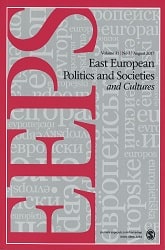The Paradoxes of Citizenship Removal: Soviet and Post-Soviet Citizenship
The Paradoxes of Citizenship Removal: Soviet and Post-Soviet Citizenship
Author(s): Ben HerzogSubject(s): Civil Law, Human Rights and Humanitarian Law, Civil Society, Political history, Government/Political systems, Post-Communist Transformation
Published by: SAGE Publications Ltd
Keywords: citizenship; voluntary expatriation; forced expatriation; Soviet Union; post-communist states;
Summary/Abstract: The Soviet Union and post-communist states are outstanding case studies of the changing meaning of expatriation and citizenship. The historical shifts in voluntary and forced expatriation and the relationship between the two signify the changing perceptions of citizenship. Although there appears to be a disjunction between the two periods, I argue that this difference is mainly in scale and is symbolic rather than a transformation of the philosophical principle that allows free movement and free emigration. Both philosophically and legally, the right to exit one’s country and emigrate is considered a basic democratic human right. However, like all philosophical and actual manifestations of this right, during both the communist and post-communist periods the right to leave was conditional. Similarly, most post-communist countries adhere to the traditional conception of citizenship that sees dual citizenship as a violation of the exclusiveness of national political membership.
Journal: East European Politics and Societies
- Issue Year: 26/2012
- Issue No: 04
- Page Range: 792-810
- Page Count: 19
- Language: English
- Content File-PDF

